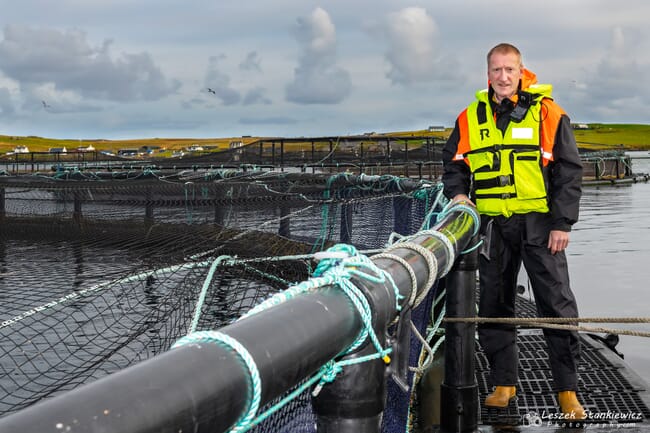
Grieg announced this week that it was planning to sell up in Shetland, prompting concerns for their 200-plus workforce in the archipelago, but Scott, who represented Shetland for 20 years as an MSP, remains confident that the sites will remain operational and that the jobs will be saved.
“I know a lot of the people personally I understand and sympathise with the uncertainty that has inevitably caused, but I also absolutely believe that the farms and the processing plant in Lerwick and the hatchery in Girlsta will all transfer to new ownership at some point. I honestly don’t know when or who that will be – whether it will be one of the existing salmon producing companies or whether it will be a new entrant, that for the moment is not known. But what I’m darn sure about is that in a period of time the corporate logo on the boilersuit and the survival suit may have changed but the very able people who work for Grieg’s at the moment will still be working in the salmon farming sector and that’s the important thing about the announcement that Grieg have made,” he told The Fish Site yesterday.
Grieg’s operations have been amongst the least profitable in the Scottish salmon sector for much of the last decade, despite mothballing a number of their worst performing sites, and the sale suggests concern by the multinational for the long-term future of the sites. However, Scott is adamant that Grieg’s operations will continue.
“I honestly believe that the assets, the sites, the sea pens in the Shetland area will transfer to a new salmon farming company and that will happen some time in the coming months,” he explained.
Scott only took up his new role this month, but brings plenty of knowledge of the salmon farming sector and has been a vocal supporter of the industry for many years.
“Having been Shetland’s MSP for 20 years I’ve spent an awful lot of time and have an awful lot of friends in the salmon farming sector. I know what it means to many small communities in outlying parts of the world, I know what it means to lots of parts of rural and island Scotland – if those jobs weren’t there, there wouldn’t be a local school, if those jobs weren’t there, there simply wouldn’t be a local community,” he said
“When you take that the average salary [in the salmon farming sector] is £37,000 a year – I don’t know any other employer that puts that sort of money into local communities and makes that kind of economic and social difference to fabulous parts of Scotland – from Unst all the way down to the Kintyre peninsula,” he added.
As he settles into the role Scott has two main priorities.
“The first is around our new Sustainability Charter, because that sets out an ambitious environmental context for our sector – it recognises the places in which we are at and the communities and environment in which we operate and serve and our determination to be great custodians of the areas we do operate in on behalf of the people we employ on behalf of the fish we put in pens and also on behalf of the communities in which we’re located. And that Sustainability Charter’s big headline, of course, is for us as a sector to achieve zero greenhouse gas emissions by 2045 – just as the United Nations wants, just as the Scottish government wants, just as international convention wants. We’re determined to be part of that and I think it’s very important for our sector to be upfront and fully engaged with that,” he explained.
“The second priority is regulatory reform… the regulatory system in Scotland is not fit for purpose – we don’t want less regulation, we want better and more efficient regulation, and streamlined regulation. That’s the big objective of the sector: working with the government to come up with the right approach to give the government confidence that that regulatory system is appropriate for the salmon farming sector but is also appropriate in terms of the government’s aspirations to see the industry sustainably and responsibly develop, and do that in a way that supports the government’s desire to see more exports from Scotland,” added Scott, who was speaking having just emerged from a hearing of the Scottish Parliament’s Rural Economy and Connectivity (REC) committed, alongside Ben Hadfield (COO of Mowi Scotland) and Anne Anderson (sustainability director of the SSPO).
“I think there’s a big shared agenda for us as a sector, with government and with parliament and the parliamentary committee was helpful in that sense because what we got from MSPs of all political persuasions was recognition that there need to be some improvement in that regulatory regime. That’s very helpful for our sector and indeed very encouraging for us,” he explained.
“It was a good opportunity to talk about all the progress the sector has made since 2018 and the last parliamentary enquiry and we were able to submit to the committee a paper, which set out all the improvements and investments we have made as a sector to meet the recommendations and requirements of the sector. I don’t think we’ve just met them I think we’ve exceeded them and I think that the committee were broadly content with that,” he asserted.



